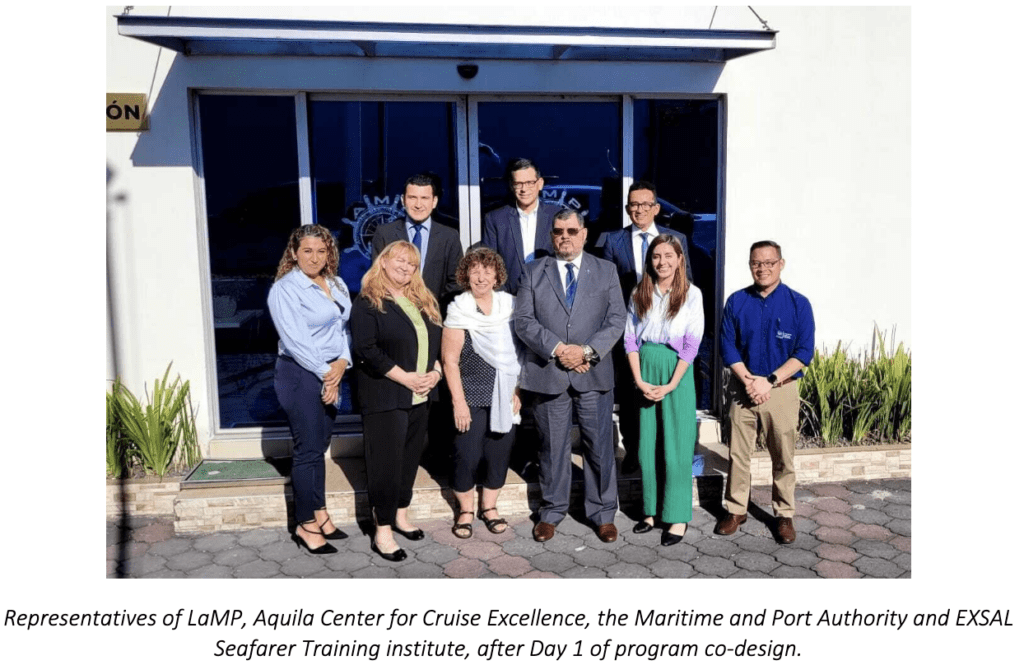FAVORITE QUOTE:
“We want to pull the youth out of gangs’ hands by providing them with better opportunities, like those offered by the cruise industry.” –
Captain Guillermo Jimenez, Executive Director of El Salvador’s Maritime and Port Authority
MAIN TAKEAWAY:
El Salvador is well positioned – by proximity and capabilities – to competitively deliver workers to maritime industries, especially to US cruise companies via C1/D “crew” visas. These visas can represent a significant safe and legal occupational mobility channel that mitigates against the pressures for irregular migration. Additionally, the global cruise industry is looking to quickly ramp-up operations following the COVID-19 operational halt, which is generating a big worker demand where labor has already been scarce, with industry insiders citing a need to hire 150,000 workers. Furthermore, stakeholders in El Salvador want to build the country’s capacity to supply workers that meet the demand of the industry. However, preparing workers with the requirements that meet the industry’s specific skill requirements is currently a challenge.
LaMP TEAM REFLECTION:
The LaMP team participated in a two-day workshop to co-design a vision for preparing job seekers from El Salvador for cruise industry jobs. The workshop constituted of local and international entities interested in preparing merchant marines for cruise jobs, including El Salvador’s Maritime and Port Authority and its Ministry of Foreign Affair’s Labor Mobility Unit; a private training company, Aquila Center for Cruise Excellence; and a non-profit training organization, EXSAL Naval Training Institute.
We want to eliminate investment barriers that prevent job seekers from accessing necessary training to secure jobs. There are a number of key capabilities that cruise workers need, including: certain level of English language proficiency, maritime certification, and hospitality-at-sea training. These all involve significant investments of time and money by potential workers, without a guarantee of work. Indeed, hiring from the industry in Central America has been low to date, precisely because there are few sufficiently trained workers and there have been no dedicated hospitality-at-sea courses. This dynamic creates a market failure, requiring coordination to address.
Together with the participating stakeholders, the LaMP team seeks to bridge the gap between skilled workers and industry demanded jobs. Aquila Center for Cruise Excellence – a Caribbean Cruise Association – presented their industry-demanded and newly developed “Preparing for Life at Sea” training curriculum. The job readiness training prepares workers in three steps: preparing for life onboard, foundational English and ship terminology, and service excellence and understanding the cruise industry. With the help of LaMP, Aquila and the EXSAL training institute will develop a model to help EXSAL absorb the training and ensure long-term sustainability. The government and philanthropic support can help and scale the program with early funding to defray costs of initial training and development of a long-term financing model.
Preparation for cruise industry jobs involves high training costs for individuals and a lengthy training engagement. The initial investment for most aspiring cruise workers is over $2,000 (including certifications, English courses, and living costs while training). This up-front cost represents over five months of work at minimum wage in El Salvador. During the visit, the LaMP team was able to estimate these investments and conceptualize a program that would make the return on investment worthwhile for the worker and the industry. LaMP seeks to design a financing mechanism to reduce a worker’s risk in this kind of investment, while ensuring long term sustainability by transitioning from grant funding to investment capital

